President Tsai Ing-wen (蔡英文) was yesterday set to become the first Taiwanese president to meet with a US House of Representatives speaker on US soil, as she was scheduled to meet with House Speaker Kevin McCarthy.
Tsai arrived in Los Angeles on Tuesday night after visiting New York, Guatemala and Belize.
She was scheduled to meet with McCarthy at the Ronald Reagan Presidential Library in Simi Valley at 10am, McCarthy’s office said.
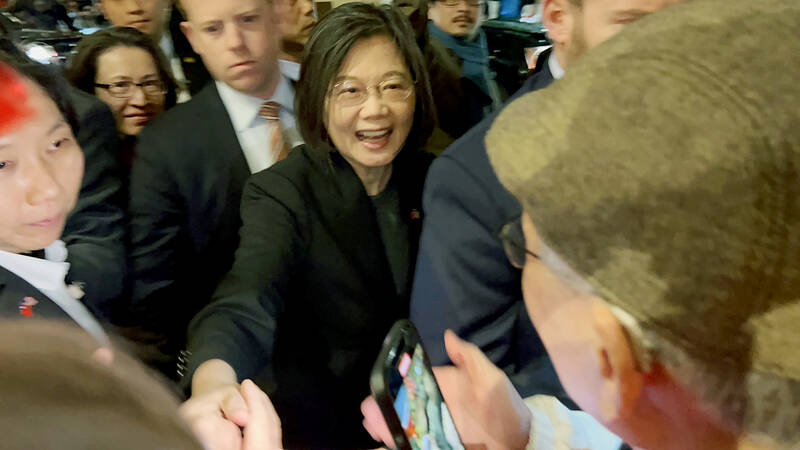
Photo: CNA
Tsai and McCarthy would issue a joint statement after the closed-door meeting, while lawmakers who take part would hold a news briefing in the afternoon, the office said.
It would be the third time a Taiwanese president would have met with a House speaker since Taipei and Washington severed diplomatic ties in 1979.
The first meeting occurred in 1997, when then-House speaker Newt Gingrich met with then-president Lee Teng-hui (李登輝) in Taipei, and the second took place in August last year, when then-House speaker Nancy Pelosi met with Tsai, also in Taipei.
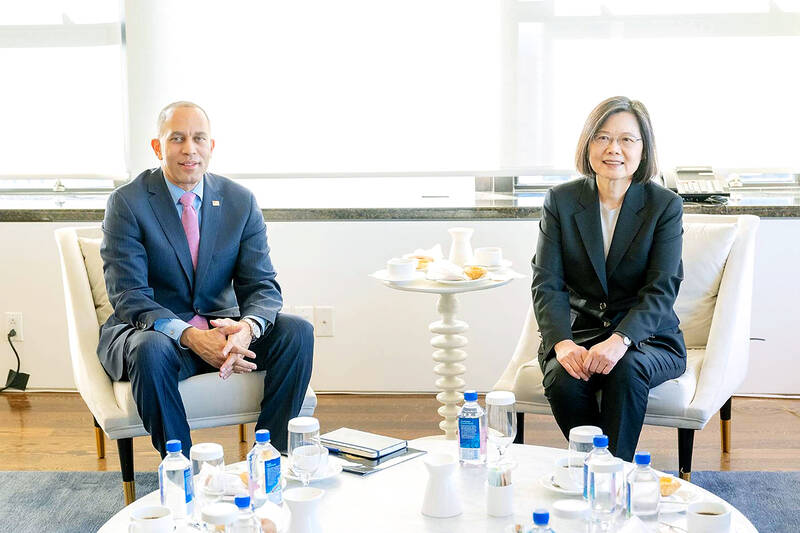
Photo courtesy of President Office
Presidential Office Deputy Secretary-General Xavier Chang (張惇涵) would not disclose the list of US lawmakers who were to attend the Tsai-McCarthy meeting when asked about the issue aboard the president’s charter flight on the way to Los Angeles.
However, a source told the Central News Agency that Republican US Representative Mike Gallagher, who chairs a new House select committee on China and who visited Taiwan in February, and Democratic US Representative Raja Krishnamoorthi, a senior member of the China committee, would be in attendance.
China has objected to the meeting, warning that it would take “resolute measures” to protect its sovereignty.
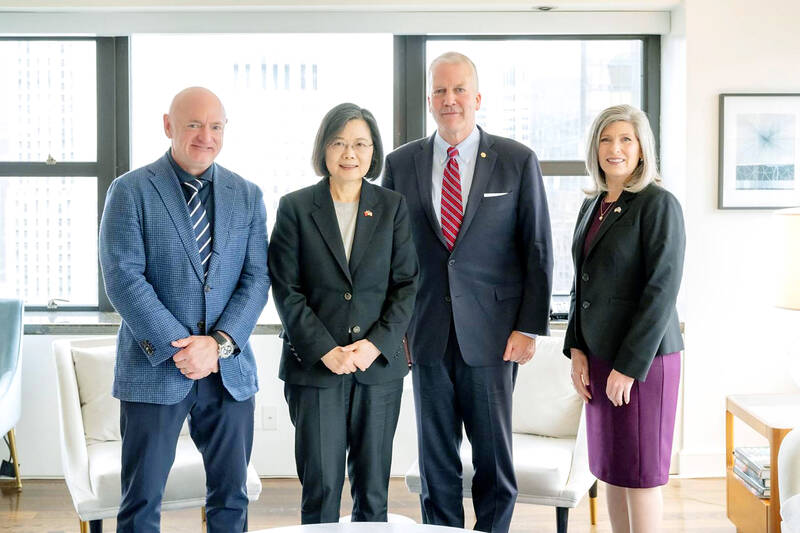
Photo courtesy of President Office
Chinese Ministry of Foreign Affairs spokeswoman Mao Ning (毛寧) on Monday said that Beijing strongly opposes “any form of official interaction and contact between the US side and Taiwan authorities.”
Presidential Office spokeswoman Lin Yu-chan (林聿禪) said that “China is not in a position to meddle in” the matter, because Taiwan and its 23 million people have the right to engage with other democratic countries.
US National Security Council spokesman John Kirby reiterated the US position, cautioning China not to overreact to the meeting, US media reported.
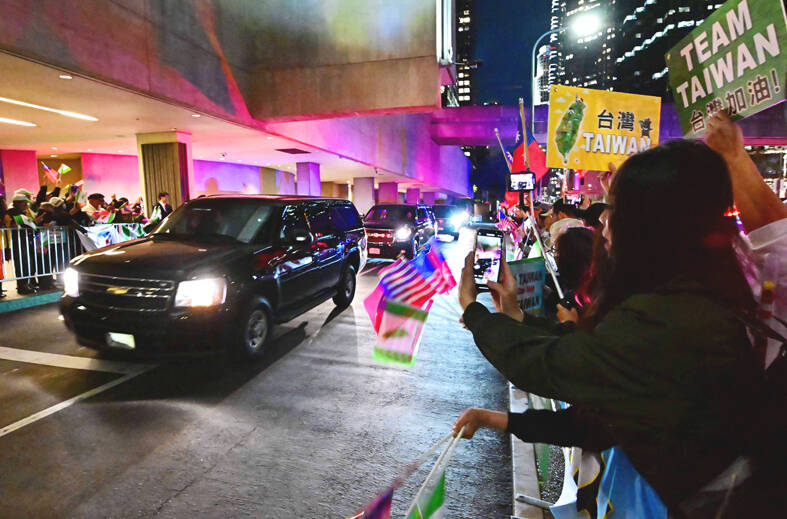
Photo: AFP
“We’ve certainly seen some rhetoric coming out of Beijing with respect to President Tsai Ing-wen’s transit,” Kirby said.
He said Tsai and “every other previous president of Taiwan has transited the United States, so there’s nothing uncommon here. There’s nothing atypical about it and there’s no reason for the Chinese to overreact.”
Tsai separately met with Hakeem Jeffries, the top Democrat in the House of Representatives, on Thursday last week and had breakfast with Republican US senators Dan Sullivan and Joni Ernst, and Democratic US Senator Mark Kelly before leaving New York the next day for Central America, Chang said.
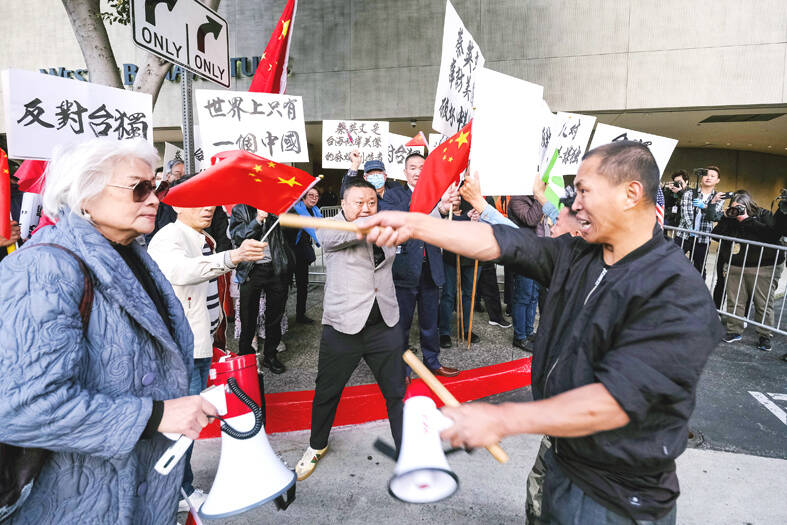
Photo: AP
Tsai expressed her thanks to US President Joe Biden and members of the US Congress for their support of Taiwan, which she said has allowed Taiwan and the US to overcome multiple challenges together.
The US’ support has also prompted many like-minded countries to pay attention to peace and stability in the Taiwan Strait and the Indo-Pacific region, Tsai said, adding that she hopes the two sides would continue to cooperate on security issues, Chang added.
Tsai said that Taiwan would continue to be a reliable economic and trade partner, and build resilient global supply chains with like-minded countries to help the global economy recover from the COVID-19 pandemic, he said.

MAKING WAVES: China’s maritime militia could become a nontraditional threat in war, clogging up shipping lanes to prevent US or Japanese intervention, a report said About 1,900 Chinese ships flying flags of convenience and fishing vessels that participated in China’s military exercises around Taiwan last month and in January last year have been listed for monitoring, Coast Guard Administration (CGA) Deputy Director-General Hsieh Ching-chin (謝慶欽) said yesterday. Following amendments to the Commercial Port Act (商港法) and the Law of Ships (船舶法) last month, the CGA can designate possible berthing areas or deny ports of call for vessels suspected of loitering around areas where undersea cables can be accessed, Oceans Affairs Council Minister Kuan Bi-ling (管碧玲) said. The list of suspected ships, originally 300, had risen to about

DAREDEVIL: Honnold said it had always been a dream of his to climb Taipei 101, while a Netflix producer said the skyscraper was ‘a real icon of this country’ US climber Alex Honnold yesterday took on Taiwan’s tallest building, becoming the first person to scale Taipei 101 without a rope, harness or safety net. Hundreds of spectators gathered at the base of the 101-story skyscraper to watch Honnold, 40, embark on his daredevil feat, which was also broadcast live on Netflix. Dressed in a red T-shirt and yellow custom-made climbing shoes, Honnold swiftly moved up the southeast face of the glass and steel building. At one point, he stepped onto a platform midway up to wave down at fans and onlookers who were taking photos. People watching from inside

Japan’s strategic alliance with the US would collapse if Tokyo were to turn away from a conflict in Taiwan, Japanese Prime Minister Sanae Takaichi said yesterday, but distanced herself from previous comments that suggested a possible military response in such an event. Takaichi expressed her latest views on a nationally broadcast TV program late on Monday, where an opposition party leader criticized her for igniting tensions with China with the earlier remarks. Ties between Japan and China have sunk to the worst level in years after Takaichi said in November that a hypothetical Chinese attack on Taiwan could bring about a Japanese

STREAMLINED: The dedicated funding would allow the US to transfer equipment to Taiwan when needed and order upgraded replacements for stockpiles, a source said The US House of Representatives on Thursday passed a defense appropriations bill totaling US$838.7 billion, of which US$1 billion is to be allocated to reinforcing security cooperation with Taiwan and US$150 million to replace defense articles provided to the nation. These are part of the Consolidated Appropriation Act, which the US House yesterday passed with 341 votes in favor and 88 against. The act must be passed by the US Senate before Friday next week to avoid another government shutdown. The US House Committee on Appropriations on Monday unveiled the act, saying that it allocates US$1 billion for the Taiwan Security Cooperation Initiative